‘Chicago 7’ fights for the pursuit of justice
“The Trial of the Chicago 7” (2020). Cast: Eddie Redmayne, Sacha Baron Cohen, Joseph Gordon-Levitt, Michael Keaton, Frank Langella, Mark Rylance, Alex Sharp, Jeremy Strong, John Carroll Lynch, Yahya Abdul Mateen II, Kelvin Harrison Jr., Ben Shenkman, J.C. MacKenzie, Danny Flaherty, Noah Robbins, John Doman, Caitlin FitzGerald, Alice Kremelberg, Wayne Duvall, Steve Routman, Mike Geraghty. Director: Aaron Sorkin. Screenplay: Aaron Sorkin. Web site. Trailer.
We all want justice. We all want to see it served. But does it always turn out that way? Seeking it requires diligence and a concerted effort to make sure that what needs to be revealed indeed is. Nevertheless, even with the best of intentions and a noble approach, it’s possible that the process can become compromised, making the need to fight for the truth even more important, a prospect explored in the gripping new fact-based drama, “The Trial of the Chicago 7.”
The summer of 1968 – like much of the decade that preceded it – was a time of turmoil in the U.S. The country was embroiled in an exceedingly unpopular war, riots plagued the streets of American cities, the assassinations of Martin Luther King Jr. and Robert Kennedy shocked the nation, and angry, sometimes violent protests on a variety of social issues were breaking out seemingly everywhere. And, with a critical election coming up, the tension level swelled, especially as reformers and establishmentarians clashed both literally and ideologically. But, for everything that had happened thus far, the most dramatic outburst was yet to come during the Democratic National Convention in Chicago. The Windy City was about to become a flash point between protestors seeking change and an old guard determined to preserve order and, if possible, do whatever it could to squelch dissent, even if presented peacefully.
In the run-up to the convention, a number of protest groups began organizing their events. They did so in an orderly fashion, too, even going through proper channels to obtain permits for their rallies and marches. However, when the city learned who these applicants were, officials systematically turned down virtually every request submitted by anyone with leftist or anti-establishment leanings (most notably by David Stahl (Steve Routman), the city bureaucrat charged with reviewing and issuing permits, who operated under express orders from Mayor Richard Daley to refuse the requests of any “anti-patriotic” groups).
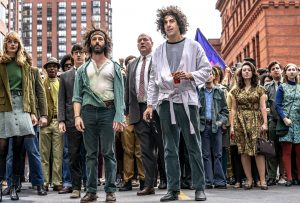
Four of the eventual Chicago 7 defendants (from left, Rennie Davis (Alex Sharp), Jerry Rubin (Jeremy Strong), David Dellinger (John Carroll Lynch), Abbie Hoffman (Sacha Baron Cohen)), lead a March through the Windy City during the 1968 Democratic National Convention in writer-director Aaron Sorkin’s “The Trial of the Chicago 7.” Photo by Niko Tavernise, © 2020, courtesy of Netflix.
Needless to say, such blatant prejudicial treatment did not set well with the protestors, who vowed to move ahead with their plans, all the while insisting on remaining peaceful in their approach. Various groups began making their own arrangements, including the Students for a Democratic Society (SDS) under the leadership of Tom Hayden (Eddie Redmayne) and Rennie Davis (Alex Sharp); the Youth International Party (Yippies) led by Abbie Hoffman (Sacha Baron Cohen) and Jerry Rubin (Jeremy Strong); and the National Mobilization Committee to End the War in Vietnam (the MOBE), whose efforts were organized by David Dellinger (John Carroll Lynch) with the assistance of Lee Weiner (Noah Robbins) and John Froines (Danny Flaherty). Black Panther Party leader Bobby Seale (Yahya Abdul Mateen II) also planned to make an appearance to give a speech.
However, despite intentions to keep matters nonviolent, that’s not how events played out. As the convention began and protestors assembled, circumstances took a violent turn when demonstrators found themselves involved in skirmishes with Chicago police. To make matters worse, the whole spectacle played out uncut on national TV for the entire nation to see. But, as tragic and embarrassing as all this was for both the Windy City and the nation as a whole, the situation was about to become even more distressing and humiliating.
With the election of Republican candidate Richard Nixon as President in November 1968, the nation’s political and social direction took a dramatic turn to the right, and Nixon was only too happy to oblige those leanings. Together with newly appointed Attorney General John Mitchell (John Doman), the Nixon Administration wanted to make an example of the protestors. As grand jury investigations into the incidents of August 1968 unfolded, the new Chief Executive and his minions clandestinely encouraged the orchestration of what was essentially a show trial aimed at bringing down the demonstrators (and, it was hoped, to break the backs of their movements through successful court decisions against them). In the wake of these formal inquiries, charges were filed against Hayden, Davis, Hoffman, Rubin, Dellinger, Weiner, Froines and Seale on the grounds of violating the federal Rap Brown Law for conspiracy to cross state lines to incite riots, despite the fact that most of them didn’t know one another until they met in Chicago. Given that, one naturally might ask, “How could that constitute a conspiracy?”

When faced with crowds of demonstrators in Chicago’s Grant Park, the city’s police mobilize to keep order, as seen in “The Trial of the Chicago 7,” now available for online streaming. Photo by Niko Tavernise, © 2020, courtesy of Netflix.
When the trial began in September 1969, the prosecution was represented by U.S. Attorneys Thomas Foran (J.C. MacKenzie) and Richard Schultz (Joseph Gordon-Levitt). The majority of the defendants were counseled by attorneys William Kunstler (Mark Rylance) and Leonard Weinglass (Ben Shenkman) of the Center for Constitutional Rights. Seale’s lawyer, however, was not in attendance due to health issues, leaving him without representation, a fact that he repeatedly raised before the court but was summarily ignored. These were among the many unfounded and inexplicable rulings handed down in the case by presiding Judge Julius Hoffman (Frank Langella), who was clearly biased against the defendants, nearly always turning down their requests while gladly approving the motions of the prosecution.
It wasn’t long before it became obvious that the fix was in, especially since Schultz and Foran were operating under explicit orders from Mitchell to get the convictions the government wanted, no matter what it took. And, because of that, the courtroom quickly turned into an unmitigated circus. For example, Seale’s outbursts over the denial of his lack of representation motions frequently turned boisterous, prompting his supporters, such as fellow Panther Fred Hampton (Kelvin Harrison Jr.) and others, to loudly begin chanting claims of judicial discrimination. (It subsequently became more than a little suspicious when Hampton turned up dead shortly thereafter.) Meanwhile, defendants Hoffman and Rubin routinely mocked the procedures and decorum of the court, calling the proceedings a political trial and routinely shouting out profanities. Then there were the numerous charges of contempt that the judge issued against the defendants and their counsel, distributed so freely that it was as if he were handing out Halloween candy. And all of this is but a mere sampling of the unbelievable events that went on.
The key issue in the case, of course, was, “Who started the violence that broke out during the protests?” In testimony offered by undercover operatives (Caitlin FitzGerald, Wayne Duvall, Mike Geraghty), the defendants were undeniably pegged as being at fault. Yet, given the peaceful intentions of the protestors, it seemed unlikely that they would have strayed so far afield from their plans, despite the treatment they received at the hands of the police.
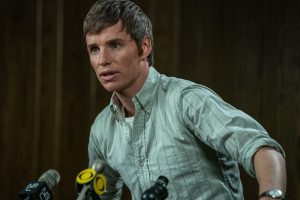
Tom Hayden (Eddie Redmayne) of the Students for a Democratic Society addresses a crowd of protestors in director Aaron Sorkin’s “The Trial of the Chicago 7.” Photo by Niko Tavernise, © 2020, courtesy of Netflix.
So who threw the first punch? That’s what the proceedings were supposed to find out. But, considering the court’s blatantly partial handling of the defendants, it became increasingly clear they would never get a fair trial or an honest judgment – unless, of course, defendants’ counsel could present a witness capable of blowing the prosecution’s allegations out of the water. And, as the protracted trial went on and on, Kunstler and Weinglass just may have found such a witness in former Attorney General Ramsey Clark (Michael Keaton), who looked into the case before leaving office and prior to Mitchell’s appointment by Nixon as his replacement. Clark’s contention that the inquiry found nothing to support pressing charges against the defendants could completely turn the tide of the trial – provided he would be allowed to testify.
Such was the state of the trial as it headed toward its conclusion in February 1970. What would be the result? Would justice be served? Or would it be denied in favor of a politically expedient outcome? That’s what a nation on edge was waiting to find out – and what might come of it as the country moved toward an uncertain future.
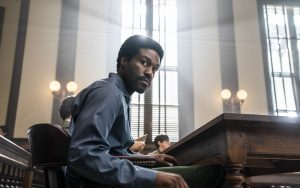
Black Panther Party leader Bobby Seale (Yahya Abdul Mateen II), a defendant without counsel during the trial of the “Chicago 8,” fights for recognition of his representation status in “The Trial of the Chicago 7.” Photo by Niko Tavernise, © 2020, courtesy of Netflix.
To achieve justice, we must rely on a process that is eminently authentic, faithful to the truth, with a sense of veracity that we can all believe in. But what happens when efforts are made to deliberately manipulate that truth, to bend it in such a way to attain a certain agenda-driven outcome? Can we guarantee that justice will be served under such circumstances, especially when a jury is expected to rule based on evidence that may be incomplete, slanted or purposely distorted? And, if not, what is the likelihood that any resulting miscarriage can be rectified at some point? Those questions were put on trial during this historic proceeding, as this film so clearly shows, warts and all.
In the end, those deciding the fate of the defendants had to rule based on beliefs that went beyond a reasonable doubt. And those beliefs, in turn, had to be based on the evidence presented in court, even if it didn’t represent the full story of what actually happened. So, in light of that, should it come as any surprise that the outcome was an outgrowth of those qualifying conditions? That’s how matters generally turn out when it comes to the conscious creation process, the philosophy that maintains we draw upon the power of our thoughts, beliefs and intents in shaping the reality we experience – including things like courtroom decisions.
Based on how matters played out during the trial, it became apparent that officialdom sought to game the system to arrive at its desired result, even if that meant floating inauthentic information in court. That included not only manipulating the testimony of its own witnesses, but also looking for ways to intentionally exclude information that would undermine its contentions, especially damaging and compelling arguments put forth by the defendants. Presenting “the facts” in that way could only serve to misrepresent the evidence and, in turn, the beliefs that jurors would make of it in handing down their verdict.
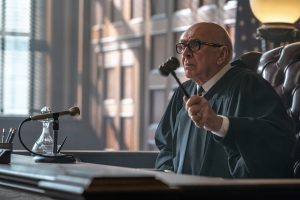
Judge Julius Hoffman (Frank Langella) presides over a chaotic courtroom in “The Trial of the Chicago 7,” now available for online streaming. Photo by Niko Tavernise, courtesy of Paramount Pictures.
And, if twisting the evidence by itself was not sufficient, then other tactics were employed to help sway the outcome. These measures included attempted jury tampering to eliminate panel members who appeared sympathetic to the defendants’ cause. But these maneuverings paled in comparison to other ploys, such as efforts aimed at excluding the testimony of former Attorney General Clark. However, perhaps the most egregious example of such malfeasance came when Judge Hoffman grew so impatient with Seale’s repeated motions regarding his representation status that he had the defendant bound and gagged in the courtroom, an action that shocked the public and ultimately led to the declaration of a mistrial in this defendant’s case (thereby reducing the number of defendants down to the now-familiar “Chicago 7”).
Initiatives such as these are prime examples of un-conscious creation at work, an approach to the philosophy based on achieving a desired result at any cost, no matter what fallout might be involved. In this case, the actions of the judge and prosecution were so deliberately hell-bent at realizing their sought-after outcome that they engaged in the practice of pushing the Universe, an intentional attempt at coercing our conscious creation collaborator into giving us what we want that we’ll do virtually anything to reach that result. While those pursuing such a course may have convinced themselves that this is a perfectly legitimate approach, they often lose sight of the fact that it can lead to all manner of unintended side effects and distorted outcomes. That was certainly the case here, for example, as evidenced by the declaration of Seale’s mistrial.
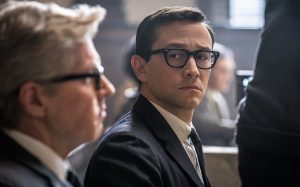
Attorneys Thomas Foran (J.C. MacKenzie, left) and Richard Schultz (Joseph Gordon-Levitt, right) present the government’s prosecutorial case in director Aaron Sorkin’s “The Trial of the Chicago 7.” Photo by Niko Tavernise, © 2020, courtesy of Netflix.
Despite the many challenges and obstacles that the defendants faced during their trial, they kept fighting, because they believed they were right. They were convinced that they had the truth on their side, if only they could figure out how to successfully bring it to the surface. But, perhaps more importantly, there was more at stake than their own destinies, including the right to free speech and the right to a fair trial, both of which were coming under attack by forces seeking to curtail or eliminate them for everyone, not just those in the Chicago courtroom. Their efforts to champion these civil liberties were part of their value fulfillment, the conscious creation concept associated with being our best, truest selves to use our beliefs for the betterment of ourselves and those around us. It’s a message that was certainly important at the time, but it’s perhaps even more crucial now than ever before in light of the current sociopolitical climate. And, to that end, the timing of this film’s release is more than a little serendipitous, a notion that should not be lost on any of us.
While this superb docudrama takes some liberties with the facts of this landmark court case, writer-director Aaron Sorkin’s latest offering gets much of it right, with what it invents making for some damned good theater. Admittedly, the picture is a tad talky in the first half hour, but that shortcoming is covered well by the film’s stellar cast, including Cohen, Rylance, Redmayne, Strong, Lynch, Langella, Gordon-Levitt and Keaton. And, once the picture hits its stride, it’s a compelling watch from that point forward, especially in the flashback sequences that re-create the events that were the subject of the trial. This is one we should all see – and make a point of embracing its message. The film had a limited theatrical run and is now available for streaming on Netflix.
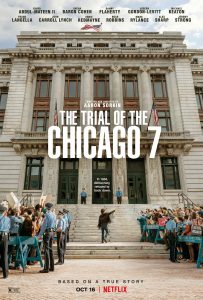
Legend has it that, upon exiting Independence Hall after the Constitutional Convention, American political icon Benjamin Franklin was reported to have described the newly formed government as “A republic, if you can keep it.” Observers might find that qualification somewhat unsettling – and with good reason. As the trial of the Chicago 7 illustrates, it can be all too easily lost, a warning that should be borne in mind today as we parallel those conditions of five decades ago. It’s a caution very much in line with Mark Twain’s observation that “history doesn’t repeat itself, but it often rhymes.” And, considering the stanzas involved in this particular verse, that’s poetry we can all do without.
Copyright © 2020, by Brent Marchant. All rights reserved.




Leave A Comment